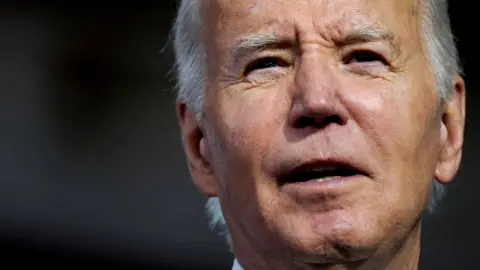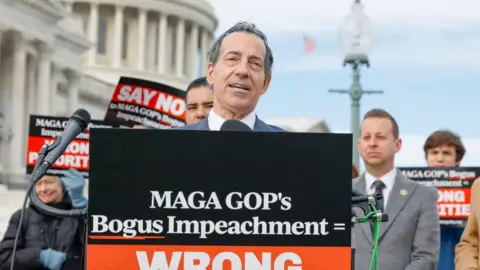Impeachment inquiry threatens Biden with election-year headache
 Reuters
ReutersBy voting to formally authorise the congressional investigation into Joe Biden, Republicans in the House of Representatives have started the ball rolling towards his impeachment.
It may be difficult to stop.
Three of the four previous times the House took this step, the chamber ultimately opted to impeach. The one time it did not was because Richard Nixon resigned before a vote could be held.
Republicans allege the president benefited from his family's foreign business dealings, although they have not yet produced any solid evidence that he did.
In the short-term, the House's action gives the investigating committees more power to subpoena documents and testimony and for judges to enforce those requests. The Biden White House, which has cited the lack of a formal vote as grounds for refusing to provide some information, may now be compelled to comply.
Ultimately, this vote could clear the path for House Republicans, despite their narrow majority, to stick together and back impeachment sometime in early 2024.
They now are on the record agreeing to move the process forward. If centrist Republicans in congressional districts won by Mr Biden in 2020 are going to take the political hit for starting the investigation, they may conclude it is best to see it through to the end.
The end in the House, at least. The matter would then move to the Democratic-controlled Senate, where it takes a two-thirds majority to convict and remove a president.
That is a high bar that has never been reached for a president in US history. And at least some Republicans have expressed concern that Wednesday's vote could be another indication that the impeachment process is being diminished.
Asa Hutchinson, a former congressman and current Republican presidential candidate, was one of the House managers who presented the case against Mr Clinton during his 1999 Senate impeachment trial.
"Impeachment should be reserved for the most serious of offences," he told the BBC. "That's how our founding fathers designed it. We don't want to get into the tit-for-tat between the parties on impeaching the president from the opposing side. It's problematic."
 Getty Images
Getty ImagesSuch concerns did not prevail on Wednesday. And now the investigations will continue, as the clock ticks toward the November 2024 presidential election.
Republicans have long viewed Joe Biden's son Hunter as a political liability for his father. If they can link his business dealings and personal conduct to the president, they have the potential to damage the elder Biden's standing with American voters.
A formal impeachment investigation, with public hearings, that leads to a House vote and a Senate trial has the potential to become a major headache for Mr Biden in the midst of an election campaign. And that remains true even if Republicans continue to lack any conclusive evidence tying the president to his son's misdeeds and misbehaviour.
There is no telling what kind of twists and turns are in store for this inquiry, either. While no evidence directly linking Mr Biden to his son's professional and personal failings has yet to be presented, sweeping powers can sometimes yield surprising results.
Bill Clinton's impeachment for lying about an affair with an intern began with an inquiry into a failed real estate deal. Hillary Clinton's email server saga came from a probe into a US ambassador's death in Libya.
Sometimes fishing expeditions catch a fish.
But if nothing turns up, the perception of corruption tied to the Biden name - the possibility of it - may be damaging enough.
Republicans could also use impeachment proceedings, along with Hunter Biden's legal battles, to draw attention away from the very real legal plight their likely presidential nominee, Donald Trump, faces.
Already there is talk of timing the impeachment process to provide "counter-programming" that distracts from a possible Trump federal trial in March on charges of illegally attempting to overturn the 2020 presidential election.
In a nation whose mood toward elected politicians is already sour, the electoral environment in the coming year may become even more toxic.
